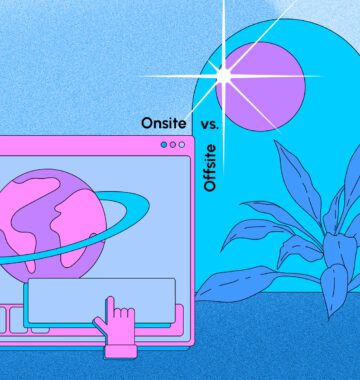This article has been fact checked and updated as of June 2023.
When it comes to growing your business, most companies now fully accept that search engine optimization (SEO) is a must. But for some reason, too many still ignore the massive potential of social media – especially in the B2B space.
If your business skips out on social media, you’re missing out! Social media can seriously enhance your SEO efforts.
We get it though. With all the algorithm changes in recent years, and every platform desperately chasing TikTok, it’s so hard to get organic results from social media. Creating great content takes time that lots of small businesses don’t have to spare, especially if only a tiny fraction of your audience might see your posts. And if you don’t have the technology to make videos, it can seem like there’s no point.
But social media isn’t just a bulletin board for you to promote your business by tacking up articles and images, and that misconception is the problem. Social media is about building brand recognition, sharing valuable and memorable content, earning trust, showcasing your expertise, and ultimately driving targeted traffic to your website.
Sounds an awful lot like SEO, doesn’t it?
In this article we’ll cover how to improve your SEO with social media, and how SEO helps social media in return.
Post Contents
Why Social Media is Important for SEO
SEO is about optimizing your website so that it turns up in searches done by people seeking your product or service, and enticing them to visit your website. Social media does the same thing – it gets your name and content in front of people interested in your offering.
Most business owners understand the importance of SEO, and of appealing to Google’s quality guidelines and ranking factors. That’s why when time, resources, and budget are limited, businesses always prioritize SEO over social media. But SEO doesn’t facilitate conversations with customers, drive user-generated content, or connect with potential customers in their favourite platforms.
The bottom line is that neither SEO nor social media can do it all when it comes to driving digital strategy goals!
Did you know that social media platforms actually now function in largely the same way as search engines? Every single major social media app now uses its own form of optimization through hashtags and keywords to categorize content. Users can follow hashtags or topics in the same way they follow accounts, and every post they engage with tells the platform about their interests.
Then the app shows them similar content from accounts they don’t follow. That content could be yours!
Check out these impressive stats on how social media drives the same goals as SEO:
- 54% of social media users research products on the platforms (source)
- Social media users overwhelmingly trust other users’ product and service recommendations over those of celebrities (source)
- 71% of consumers who have had a positive experience with a brand on social media are likely to recommend the brand to their friends and family (source)
- Consumers are 6x more likely to buy from a product page that includes pictures from social media, ie. content that shows real people using the product (source)
Both social media and SEO have similar potential for reach. There are 8.5 billion Google searches done each day, 1.5 billion Facebook searches, and 1 billion hours of YouTube video are watched. Of course, only a tiny fraction of those searches relate to what you do, but you get the idea.
Where social media outshines SEO is in the social aspect. SEO gets people to come to a website, but it doesn’t gather anything from them in return. That’s left up to your website’s user experience, integrations, and forms.
You can use social media to conduct audience research by asking questions through posts and polls. You can engage with customers in the comments, learning valuable insights about their wants and needs (while responding to questions and concerns).
And then you can use all of that precious information to improve your offering – including the keywords you target and the SEO content you produce.
How Does Social Media Impact SEO?
Let’s just dive right into the goods. Here are five major ways social media impacts SEO:
- Content amplification — helping your content get discovered and enjoyed by more people, especially when it’s not on page one of search results
- Brand awareness — building your online presence through exposure, so that when your name appears in the search results it’s familiar
- Trust and credibility – supporting your reputation within your industry, especially when someone is researching you online because of a referral
- Link-building – the more places your content can be discovered, the more chance that it will earn SEO-friendly inbound links (backlinks) when cited on other websites
- Local SEO — increasing your local presence and ranking through business profile data and customer reviews
Each of these areas has an indirect impact on your SEO, and thus on how you rank. This is why social media SEO is important for businesses of all sizes and industries.
And don’t forget:
- Your company social media profiles appear in searches for your business, often right under your website – they’re a great way to take up that whole first page and leave no room for competitors
- Search engines index tweets, which appear in search for your business and can also turn up in results for specific queries
- Google regularly tests new features like Perspectives, which showcases top social media posts on a given topic in a search results-style page
The official answer is no, but also yes.
You may have heard about social signals as a Google ranking factor. This idea says that social media posts, engagement (likes and comments), shares, or follower counts can directly impact ranking.
Although Google DOES use your social media accounts to verify the legitimacy of your business, it’s typically only your NAP – that’s name, address, and phone.
Google is extremely picky about NAP accuracy, so it will check everywhere that your business is listed to make sure all contact details match. If your email address or website link is different, Google might decide that your business shouldn’t be shown to someone doing a local search.
Google may or may not check social media profiles to verify a website author’s firsthand experience, expertise, authoritativeness, and trustworthiness (E-E-A-T). E-E-A-T is not a specific ranking factor itself, and more like a cluster of signals that create a factor: content from a trustworthy author and site will rank better.
Most of the other supposed effect of social signals is actually the result of indirect ranking signals – lots of traffic coming to your website and engaging with content in a positive way, and earning more links, which helps it rank higher.
Bing, on the other hand, does use social signals in its ranking factors.
Like Google, it uses social media accounts to verify a brand’s credibility. But beyond that, if content gets a lot of social shares, Bing’s algorithms take it as a sign that it should be ranked higher. Bing even uses social content in its knowledge panels.
How to Use Social Media for SEO
In the previous section I shared five ways social media impacts SEO. Now we’re going to talk about how each of them works.
1. Content Amplification to Facilitate Indexing and Ranking
In a perfect world, every time you published a new piece of content it would land right on page one in Google search results, and everyone would love it.
- The first Google search result has a click-through rate of 27.6% (source)
- 95% of people only click results from page one (source)
Unfortunately, Google owes you nothing. Just because you have a website doesn’t mean Google has to index it or show it in page one, even for searches for your company’s name!
From high-authority competitors to images, answer boxes, and videos galore – page one is a shrinking opportunity. Even an on-point keyword strategy can’t drive traffic alone. Unless you employ a gifted content writer or are really good at YouTube or image SEO, all of your content is going to start out on page two or lower.
That doesn’t mean you should quit producing content. You just need another way to get it discovered! Enter social media.
- Sharing pages and posts on social media gets traffic to those pages regardless of their ranking on Google
- More traffic from other sources means more chances to get noticed by Google – either by a high volume of traffic identified by Google Chrome or by those visitors then linking to your content outside social media
- This can lead to faster indexing (if you aren’t using an SEO plugin or doing manual indexing requests in Google Search Console) and opportunities to rank or rank higher
- Social posts reach a targeted audience already interested in your business and content, so they’re likely to click and to engage well
- Regularly sharing relevant, helpful content builds your audience – and potential for future website traffic
- You can also use social media to drive traffic to older content that’s still useful (we recommend regularly updating your old content to help it rank higher, but not everyone has time for that!)
And if your content invites strong user interaction ranking signals (longer sessions, deep scroll depth, viewing additional pages)… is some SEO magic right there.
2. Brand Awareness = SEO Love
In order to grow your business, people need to actually know about you. Whether you’re a local brick-and-mortar shop or an international brand, you can’t bring in new customers if they never hear your name.
SEO helps your website get found in search results through organic keyword strategies and other on-site optimizations. Social media takes it to the next level.
- Hashtags and keywords can be used to get your posts and your profiles discovered, enticing people to follow your business
- Commenting on relevant posts on behalf of your business gives you visibility to everyone engaging with that post
- Happy customers can tag you in posts about your product or service, which extends your visibility to all of their followers
- You can also create branded hashtags to encourage people to tag your business and share their experiences with friends and family
- On TikTok, even an account with no followers can create a video that quickly goes viral and leads to thousands of follows
- Influencer marketing is huge for a reason – the influencer tags your business and amplifies your business to their larger following
How does this tie into social media SEO? Once again, it comes down to traffic.
More awareness of your business through social media means more visits to your website from those platforms. If they’re using Chrome, Google sees this behaviour.
Those same people who enjoyed your social content are also more likely to Google your business when they need what you sell, or to recognize your name in search results and choose your site over the competition.
3. Build Trust in Your Business
Much like brand awareness, trust in your business is essential to growth. The more expensive your offering (hello, B2B!), the more likely your customers are doing tons of research before contact – including looking into what kind of a business you are.
- Social proof is a thing – people want to see reviews, testimonials, statistics, awards, and more before they give you their money, and social media is a great way to both collect and share social proof
- As mentioned previously, 54% of social media users research products and brands on social platforms (source)
- How-to content is a great way to showcase your expertise while being helpful – and unless you have a massively successful website, sharing it on social media gets it seen much more quickly than hoping for organic search traffic
- The more familiar consumers are with your business through social proof and content you share on social media, the more likely you are to be front-of-mind when they do need your product or service
And the kind of research people do into your business isn’t limited to what you sell and whether it works. They’re looking into all the cracks and crannies.
Do you treat your employees and customers well? Do you take measures to be environmentally sustainable? What issues do you care about? Do you give back to your community?
It can be difficult to get too deep into all of these areas on your website, but it’s easy to show your authentic, human side and do great brand storytelling on social media.
Need a little help with your storytelling? Learn How to Create a Brand Strategy for Business. Includes links to examples and templates!
4. Social Media for Bigger, Better Link-Building
No matter how many times the SEO landscape changes, one thing remains the same: backlinks play a HUGE role in your ranking.
Backlinks, aka inbound links, are links from another website to yours. That other website is officially giving you the nod of approval to Google. The better quality the referring site, the better the outcome for you.
Social media itself doesn’t give you backlinks — the website links in your social profiles are direct traffic (unless you’ve smartly tagged them in Google’s UTM builder), and the links to your content you and other accounts share as posts fall under social media referral traffic.
But the combination of brand awareness and content amplification driven by social media can result in more backlinks.
Every person and business that experiences your social media content is a potential link waiting to happen. I’m forever citing other websites as sources for data in my blog posts on the Forge and Smith site, and some of them I have definitely found through social media.
Once again, social media SEO magic at work!
5. Social Media Supports Local SEO
Local SEO is essential in some industries — like hospitality, dining, and entertainment — and for small businesses with brick-and-mortar shops. Whether it’s a regular search or a voice search, you want your business to appear on page one when someone in your area is seeking your service.
Remember how we talked about NAP (name, address, phone number) above? NAP is huge in local SEO, because proximity to the searcher is one of the key ranking factors to get on the map results.
- Social media profiles give you another place to publish your location contact details for Google to check
- Social posts give you a place to use local hashtags, local keywords and location tags
- Your Google Business Profile now kind of functions like an arm of social media, because you can publish posts
By now you’ve probably realized that there’s a common theme here: the impact of social media on local SEO is increased visibility and traffic, which can indirectly impact search ranking in all of the ways already mentioned.
Here’s the sweet bonus of social media for local SEO – Facebook reviews are shown in Google search results. While they aren’t a ranking factor (unlike Google Business reviews), seeing those reviews in search results can sway a person’s decision to click or not to click.
So make sure your social media NAP matches up with the footer of your website and any location pages you have. Get those hours correctly set up on all of the relevant places that people are checking, like Facebook and Google Business – and make sure to update them for holidays and other closures!
And definitely use local keywords in all of your social media profiles, including hashtags where relevant.
How SEO Helps Social Media
But enough about social media SEO – what about SEO, um, social media? Social isn’t doing all the work in this partnership!
- Seeing your content in the search results can lead to people seeking your social profiles and giving you a follow
- Google does reward the time and effort you spend on maintaining a social profile by indexing it in searches for your business name (which it verifies through – you guessed it! – matching your NAP to your website and Google Business listing)
- You can use your SEO keyword research to write better-optimized post captions, and to identify hashtags
- Your Google Analytics data will provide great insights into the content and topics that resonate best with your audience through traffic and engagement, which can guide social content creation
In conclusion, social media SEO is a dynamic duo you can’t afford to ignore. It’s an opportunity to build a community, humanize your brand, and elevate your message and your work — while mutually supporting your efforts in SEO and marketing.
I hope you’re now 100% convinced about the awesomeness of social media SEO. Happy optimizing!





